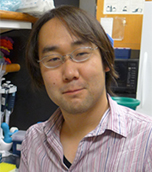Our researchers are a fierce driving force behind therapeutic development and future treatment. Let’s find out what makes them so passionate about KIF1A! Each month, one of our invested KIF1A researchers will be in the spotlight. Dr. Shinsuke Niwa is next in line for our monthly Q&A.

Shinsuke Niwa, PhD
Principal Investigator of Niwa Lab & Associate Professor of Frontier Research Institute for Interdisciplinary Sciences (FRIS) at Tohoku UniversityHistorically, Shinsuke Niwa, PhD, has studied molecular and cellular aspects of various classes of kinesin motors. Dr. Niwa now heads his own laboratory at Tohoku University in Japan where his group continues to study diverse aspects of kinesin-based transport in cells utilizing genetics, cell biology, biochemistry and biophysics to address these questions. Dr. Niwa has also co-authored research papers specifically involving disease associated mutations of KIF1A, utilizing unc-104 mutant worm models.
If you could have any superpower, what would it be and why?
I want to fly to California. My lifetime collaborator, Dr. Kyoko Chiba, is staying in UC Davis and continues her KIF1A research there. I used to visit UC Davis once every 3 months before COVID-19. Because of the pandemic, we’ve not met for more than a year.
When did you know you wanted to be a scientist? Why were you drawn to this field?
As far as I remember, I wanted to be a scientist when I was a preschool student. I felt a scientist wearing a lab coat was cool!
What do you love most about your job?
I can become friends with many people from many countries through my work. I can visit a lot of countries to meet, drink beer and talk with them.
What is the most challenging aspect of your job?
Competition!
What development are you most excited about in terms of KIF1A research?
In my PhD thesis, I studied KIF1A using cultured neurons and knockout mice in Dr. Hirokawa’s lab where KIF1A was originally found. After completing the work, we thought there were no fundamental questions remaining in KIF1A research and moved to analyze other kinesins. However, 5 years later, I met KIF1A again in Dr. Kang Shen’s lab at Stanford University when I studied axonal transport mutant in worms.
I couldn’t get through a day at work without:
Green tea! I love Japanese green tea very much and drink more than 1 liter every day.
I am most motivated by:
Unexpected findings. For example, people have thought KIF1A mutations abolish KIF1A function, but we found some mutations inversely overactivated KIF1A.
When you are not studying KIF1A, what do you do?
I’m looking at worm neurons to look for new genes and new mutations involved in the axonal transport. (We originally found overactive KIF1A mutations by analyzing worm neurons.)
How has COVID impacted your daily work routine?
Luckily, Japan can manage the problem relatively better than other countries. However, the pandemic significantly disrupted the supply chain, and we are now suffering from a shortage of labware such as gloves and plastic tips for pipettes.
